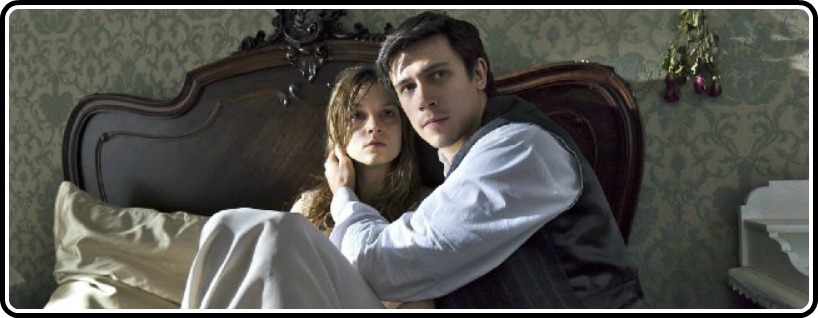Generation-spanning love stories are no rarity in the film world. Even less rare? Stories of love that has both an unquenchable thirst to be fulfilled and an impossibility of doing just that. These stories of love spanning decades with only a snowball’s chance in Hell in ever actually becoming tangible come about as often during any given year as a comic book action film or a silly, juvenile comedy. However, few look quite as opulent as the newest film from director Jos Stelling.
Few are also as narratively bland.
Entitled The Girl And Death, the film is written and directed by Stelling along with co-writer Bert Rijkelijkhuizen, and tells the story of a star crossed romance between traveling doctor Nicolai and kept woman Elise, a woman living in a country compound with the keen eyes of a duke laid firmly upon her. Bookended by a prologue and epilogue told from the point of view of an older Nicolai seemingly returning to the hotel where all these events ostensibly took place, the film then thrusts us through the various moments the pair shared over a handful of years. From the introduction to the very young and handsome Nicolai to the moment we share with him as we watch him instantly fall head over heels in love with the breathtaking Elise, all the way to the various moments of romantic demise the pair share throughout their lives, the film is a relatively paint by numbers romantic drama, that is saved by a series of solid performances and a director at the top of his game.
While calling a costumed romantic drama “cliche-ridden” seems like an easy dart to throw in its direction, it fits this film like a glove. Rarely stepping out of the viewer’s comfort zone, the film’s greatest sin is that despite performances that seem to give every word uttered by every member of this cast life breaking importance, the emotional range of this film rarely becomes palpable. Despite a few shockingly enchanting moments of dry comedy near the film’s front half, the emotional drama is both rather standard narratively and almost stagnant viscerally. A tale of love against the most dire of odds, the films 127 minute run time doesn’t help as the pace here does seemingly get bogged down in uninvolving melodrama, and despite it being an absolutely breathtaking film to look at, it does get to be a bit of a slog as the emotional core never really warms up to the viewer.
However, the aesthetic here almost single-handedly makes it worth seeing. Beautifully lit by Goert Giltay (a photographer I’m not too familiar with), the film has a lush sense of style, with beautifully rich colors soaking every frame of the picture. The first and final codas are especially powerful, washed almost entirely in a blue hue that adds to the pictures utterly uncanny sense of melancholy. Almost oppressive in its melancholy, the film is an involving watch stylistically, with few camera moves to speak of but a raw and impactful use of light and color. The previously mentioned sense of humor also really helps cut much of the film’s self importance. There are a handful of almost audible-laugh-inducing moments here, ranging from an ill-placed apology to the constant presence of a vapid bellhop, a sense of humor that really helps give this film a tad bit of life, a sense of life that is sadly missing from much of the rest of the picture.
Thankfully the cast isn’t entirely included in that collection of flaws. Despite being admittedly somewhat dry, the lead performances here from Sylvia Hoeks and Leonid Bichevin are serviceable, but ultimately are undone in many ways by a script unwilling to let go of its love affair with poorly toned melodrama. Melodrama is not always a bad thing, far from it actually. However, where various directors absolutely get this sense of unwavering love as something purely human and raw, this script and in many ways these performances feel cumbersome and really quite add a bit of weight onto the shoulders of an otherwise entrancing little picture. Dieter Hallervorden is great here as the duke in question, and while some moments here really stand out as supreme acting set pieces (I particularly love the first card game sequences, a second of which nearly destroys the picture), they are overall not much more than servicable romantic drama turns in an otherwise beautifully decorated and framed motion picture.
Overall, the film’s greatest flaw here is its inability to muster emotion out of its viewer. Bland and dramatically telegraphed from the opening frames, this romantic drama is a vibrantly shot motion picture ultimately undone by a script and performances that never allow the emotion to get truly off the ground. Worth seeing for the stellar cinematography, costume drama fans won’t find much to chomp on here, and fans of romance-focused dramas will be hard pressed to find any drama in this romance.




![Bergman Island (The Criterion Collection) [Blu-ray]](https://criterioncast.com/wp-content/uploads/2022/11/bergman-island-the-criterion-collection-blu-ray-400x496.jpg)
![This Is Not a Burial, It’s a Resurrection (The Criterion Collection) [Blu-ray]](https://criterioncast.com/wp-content/uploads/2022/11/this-is-not-a-burial-its-a-resurrection-the-criterion-collection-blu-ray-400x496.jpg)
![Lars von Trier's Europe Trilogy (The Criterion Collection) [The Element of Crime/Epidemic/Europa] [Blu-ray]](https://criterioncast.com/wp-content/uploads/2022/11/lars-von-triers-europe-trilogy-the-criterion-collection-the-element-of-400x496.jpg)
![Imitation of Life (The Criterion Collection) [Blu-ray]](https://criterioncast.com/wp-content/uploads/2022/11/imitation-of-life-the-criterion-collection-blu-ray-400x496.jpg)
![The Adventures of Baron Munchausen (The Criterion Collection) [4K UHD]](https://criterioncast.com/wp-content/uploads/2022/11/the-adventures-of-baron-munchausen-the-criterion-collection-4k-uhd-400x496.jpg)
![Cooley High [Criterion Collection] [Blu-ray] [1975]](https://criterioncast.com/wp-content/uploads/2022/11/cooley-high-criterion-collection-blu-ray-1975-400x496.jpg)